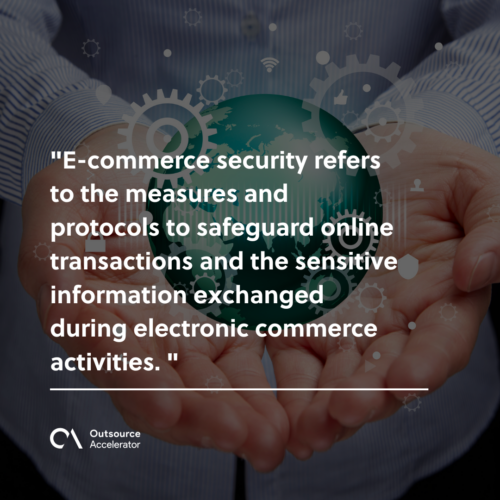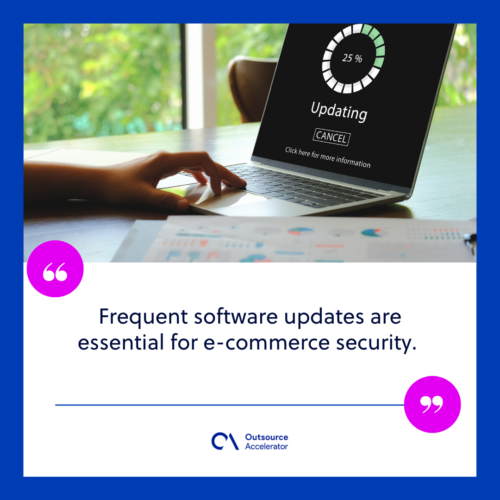Safeguard your online business: Outsource e-commerce security to OP360

Are you an online business owner concerned about your customers’ data safety and protecting your business from cybercrimes?
If so, this article is for you. Keeping up with e-commerce security trends while running a business can be challenging.
Find out why you should consider outsourcing e-commerce security to a reputable service provider like OP360.
What is e-commerce security?
E-commerce security refers to the measures and protocols to safeguard online transactions and the sensitive information exchanged during electronic commerce activities.
It is a critical aspect of the digital marketplace because it directly addresses the protection of both customers and businesses from various online threats and vulnerabilities.

Common threats to e-commerce security
To ensure the safety of your online business, you need to be aware of the most common threats to e-commerce security.
Here are five of the most common threats:
Data breaches
Data breaches pose a major risk to e-commerce security. These breaches happen when unauthorized individuals gain entry to your database and steal sensitive information.
Once this data is in the wrong hands, it can be used for financial fraud and identity theft.
Phishing attacks
Phishing attacks are deceitful schemes aimed at acquiring sensitive data, like:
- Usernames
- Passwords
- Credit card details
These attacks can result in unauthorized access to your website and database.
Malware
Malware is harmful software created to infiltrate or damage your computer system. It can take various forms like:
- Viruses
- Worms
- Trojans
Malware can infect your system, steal confidential data, corrupt or delete files, and disrupt regular business operations.
SQL injection
SQL injection is a hacker technique that inserts malicious code into e-commerce websites’ databases. This code can enable unauthorized access to sensitive data stored in the database.
SQL injection poses a serious threat to e-commerce security as it can grant full control over the database, potentially causing financial and reputational harm to the business.
Outdated software
Outdated software is a notable risk to e-commerce security. When software becomes outdated, it lacks regular updates and patches from developers, making it vulnerable to cyberattacks.
E-commerce security best practices
To protect your e-commerce business from cyber threats, we recommend you follow these best practices:
Use HTTPS
Securing your e-commerce website with Hypertext Transfer Protocol Secure (HTTPS) is essential to:
- Protect sensitive customer data
- Build trust
- Comply with industry standards
Purchase or obtain a trusted SSL/TLS certificate from a reputable certificate authority (CA) like Let’s Encrypt, DigiCert, or Comodo.
Ensure the certificate matches your domain name (e.g., www.yourstore.com).
Regular software updates
Many malware attacks target outdated software with known vulnerabilities. Frequent software updates are essential for e-commerce security.
Developers consistently release patches and fixes to address vulnerabilities and software bugs. These updates keep your software current and safeguard it from cyber threats.
Strong authentication
Strong authentication involves confirming users’ identities before granting access to a website or database.
One effective method is multi-factor authentication, where users provide two or more forms of identification. This added layer of security makes it harder for hackers to gain unauthorized access.
Secure password policies
Implementing robust password policies is vital for e-commerce security.
Passwords should be sturdy, comprising a minimum of eight characters, a combination of letters, symbols, and numbers.
Ensure that employees and customers do not reuse passwords.
Firewall protection
Installing a firewall is essential for safeguarding your e-commerce business.
A firewall is a network security tool that watches and filters incoming and outgoing traffic, allowing only authorized entries. It also provides defense against Denial of Service (DoS) attacks.

Why should you outsource your e-commerce security measures to OP360?
E-commerce security is paramount in today’s landscape of escalating cyber threats. Outsourcing your e-commerce security to OP360 gives your the following advantages:
- Expertise. OP360 boasts a team of seasoned e-commerce security specialists well-versed in the latest cyber threats. They can effectively safeguard your business.
- Constant monitoring. OP360’s monitoring services vigilantly oversee your website and database, promptly identifying vulnerabilities and risks for swift resolution.
- Tailored solutions. OP360 crafts customized security solutions tailored to your e-commerce business’s unique requirements.
- Cost-effective. Outsourcing to OP360 is a cost-effective alternative to maintaining an in-house security team, particularly advantageous for small to medium-sized e-commerce enterprises.
By entrusting your security to OP360, you can focus on your core business operations with the confidence that your e-commerce security is in capable hands.
Head over to OP360’s website to learn more about its services and pricing!






 Independent
Independent




